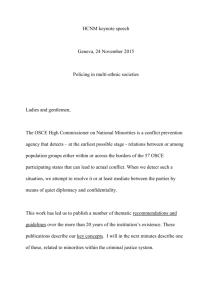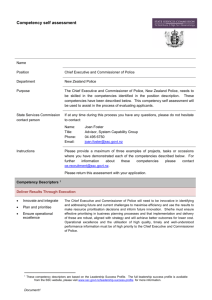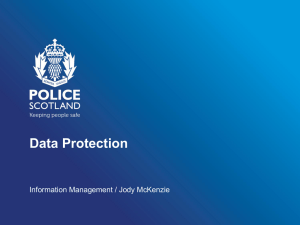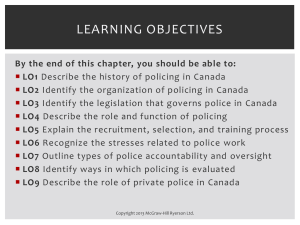Reforming an Garda Síochána
advertisement
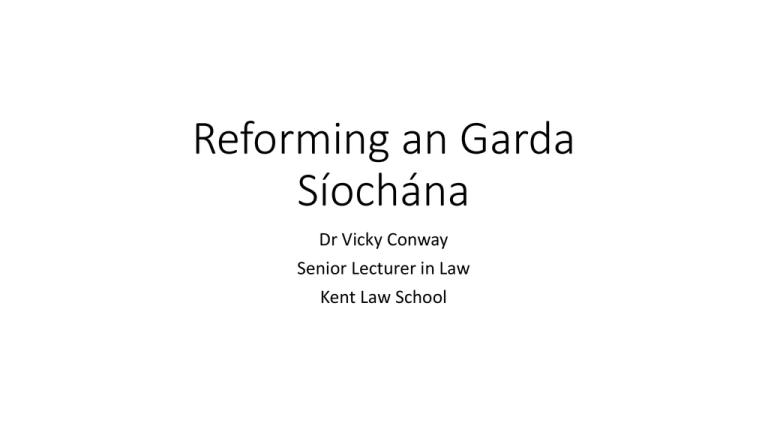
Reforming an Garda Síochána Dr Vicky Conway Senior Lecturer in Law Kent Law School Focus for reform • Culture • Governance • Accountability • “We are at a defining moment in the history of the policing service, a moment at which the principles of accountability, transparency and professionalism must be at the core of a strong, confident and connected policing service and at which such principles must be seen to be at the core of everything we do in order that we are trusted and valued by the public we serve.” • Acting Commissioner O’Sullivan, Joint Committee on Justice, Defence and Equality, 29 May 2014 What kind of police service? • Professional • Independent • Accountable • Democratic • Trusted • Effective • Respectful of human rights Culture Accountability Governance Culture • Manning: ‘accepted practices, rules and principles of conduct that are situationally applied, and generalized rationales and beliefs’ (1989: 360) • Chan: ‘a layer of informal occupational norms and values operating under the apparently rigid hierarchical structure of police organisations’ (1999: 43). • Reiner: ‘Cop culture has developed as a patterned set of understandings that help officers cope with and adjust to the pressures and tensions confronting the police’ (2000: 87). Governance • “can be defined broadly as encompassing the procedures and methods aimed at ensuring the efficient discharge of the policing function... includes key management issues such as: policy formation & implementation; the determination of priorities & strategies; deployment choices; the allocation of resources; the maintenance of standards; & internal discipline... associated with the promotion of values such as transparency, responsiveness & the maintenance of professional, ethical & human rights standards in policing... the instruments and processes of governance can be used to deploy the police as a tool of repression, and ultimately as the facilitator of a police state.” (Walsh and Conway, 2011) Accountability • “all procedures and methods which can be deployed to render an individual police officer, and the police authority as whole, answerable to another person or body whether that person or body is located inside or outside the police force in question.” (Walsh & Conway, 2011) Governance Minister Home Secretary Inspectorate Separation of Powers Commissioner Chief Constable PCCs Ireland’s Policing Authority • Should be required to: • (a) secure the maintenance of an Garda Síochána, • (b) secure that an Garda Síochána is efficient and effective. • Hold Commissioner to account for the exercise of— • (a) the functions of the Garda Commissioner, and • (b) the functions of persons under the direction and control of the Commissioner • • • • • Set 3-5 year plan Approve annual plan Approve Budget Nominate Commissioner & senior office holders National Security Relationships GSOC Inspectorate Authority Governance Courts Rep Bodies ICCL Minister Commissioner Accountability • Patten Commission: “accountability places limitations on the power of the police but it should also give that power legitimacy and ensure its effective use in the service of the community” (1.13). Reforms to GSOC • Remit: Commissioner • Admissibility Requirements • Appointment of Commissioners • Independent Investigation • Publication of data • Engagement with young people • See Conway (forthcoming) in Defining Events (Manchester University Press) • “It is now an organisation that is more open to the outside. It has a new professionalism in its management development and selection systems. It is prepared as never before to perform its functions effectively, efficiently and fairly in responding to the needs of local communities. Thanks in large measure to the findings and recommendations of the Morris Tribunal, we now have a system of oversight in place to ensure, as far as humanly possible, that the abuses uncovered by the tribunal do not recur” (Minister for Justice, Dermot Ahern in Dáil Éireann, 2008)


